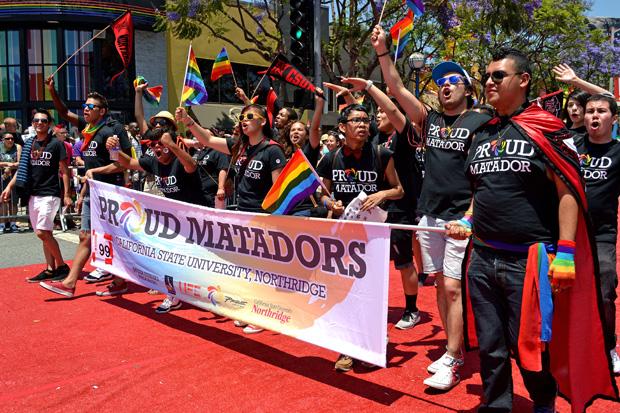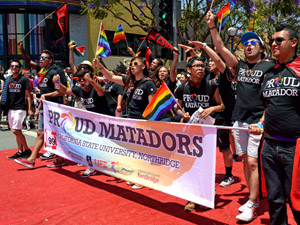
The Supreme Court of the United States made two historic rulings Wednesday on the legal status of same-sex marriage.
In a 5-4 vote, the justices ruled that the federal Defense of Marriage Act, a 1996 law passed by congress excluding same-sex couples married legally in their states from recognition under the federal tax code, is unconstitutional because it did not provide “equal liberty” under the law.
In the case of Proposition 8, a California ballot initiative passed in 2008 which ended the short time that same-sex marriage was considered legal in the state, the justices dismissed the case after deciding that the proposition’s defense had no “standing” to defend it in court.
“I am happy, but there is still struggle and more work (needs) to be done for the LGBQT community,” said Jessica Cardiel, a senior who is double majoring in Chicano and women studies and works as a peer mentor at the Pride Center
The DOMA case was brought to the court by 83-year-old Edith Windsor, who sued the federal government for requiring her to pay over $360,000 in estate taxes when her wife, Thea Spyer died in 2009. Windsor was denied a federal estate tax exemption usually given to married couples due to section three of DOMA, which defines marriage as “only a legal union between one man and one woman as husband and wife'”
In the majority opinion written by Justice Anthony Kennedy, section three of DOMA was struck down because it “violated liberty protected by the Fifth Amendment.” The court left section two of DOMA unaltered, which allows states to refuse recognizing gay marriages performed in other states.
The ruling in Prop 8 now clears the way for same-sex marriages to legally resume in California, but will not have the same constitutional or civil liberties implications. Rather than making any broad statements on the right to marry, the justices dismissed the case entirely, stating that since the defense team did not represent the state of California, they had no legal standing to defend the law.
“It’s going to (spread) nationwide because we are going to fight for it,” said Cardiel.
President Obama released a statement on the DOMA ruling where he “applauds” the court for striking down a law that “enshrined” discrimination.
“The laws of our land are catching up to the fundamental truth that millions of Americans hold in our hearts: when all Americans are treated as equal, no matter who they are or whom they love, we are all more free,” said President Obama.
James Lopez, a graduating senior double majoring in philosophy and religion at CSUN says the gay marriage debate is not about equal rights and believes the fundamental issue in the debate has been lost.
“This is not about benefits, equality, gay people, love, religion or God , but rather the institution of marriage itself, and what defines a marriage,” said Lopez.
“Why fight to redefine the whole institution when historically speaking, marriage has been between a man and a women, defined by mankind. Around 2,000 years ago there were gay people, but I don’t think they wanted to redefine marriage back then,” said Lopez.
Lopez also said gay people are not the “new Black” that some people claim because of the interracial marriage ban in the past.
“Sexuality is not a class but rather the way you are born,” said Lopez.
Hugo Valencia, a senior majoring in CTVA, says norms and social definitions are not static, but rather evolves with time.
“We have redefined things for a long time and not too long ago, women could not even wear pants,” said Valencia.
Within ten years, the gay right movement have marked historical victories for the community. In 2003, the Supreme Court struck down Texas law banning same-sex marriage, ruling the law as a violation of privacy. Fast forward ten years, same-sex marriage is now legally recognized in 13 states as well as in the district of Columbia. With section three of DOMA gone, gay and lesbian couple who are married will be able to take advantage of the same federal benefits given to straight couples such as tax break and pension rights.
“Being a Catholic I should oppose gay marriage, but I believe in equal rights,” said Saskia Garibaldi, a senior majoring in sociology at CSUN.
Nami Hatfield, a CSUN graduate, said that even though things are more progressive now, the work must continue.






